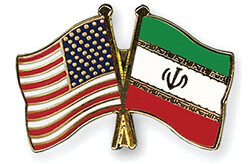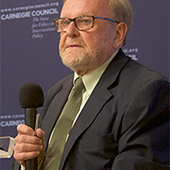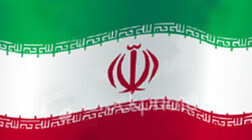As the P5 + 1 talks with Iran lurch from one cul de sac to another, it is high time to review some of the factors that contribute to the current impasse. It is not within this essay's purview to review the entire modern history of tensions between Iran and the U.S. and its allies. But it is important to note that although most would point to the 1979 Embassy hostage crisis in Tehran as the critical negative watershed, friction actually dates back to more than two decades earlier. The more significant milestone is August 1953, when the democratically elected prime minister of Iran, Mohammed Mossadeq, was overthrown in a coup engineered by British and U.S. intelligence services that led to the restoration of Shah Mohammad Reza Pahlavi.
This essay considers how we arrived at this point. It focuses on the sanctions in place against Iran and other hostile measures undertaken by the West; and on the purported casus belli (albeit at this stage a cold war): Iran's nuclear program.
Simply put, Iran is awash in sanctions, both those unilaterally imposed by the United States, and by international actors such as the European Union. U.S. sanctions were first imposed in November 1979 at the time of the hostage crisis, when President Jimmy Carter ordered a freeze on all Iranian assets "which are or become subject to the jurisdiction of the United States." In 1984, the United States implicated Iran in the bombing of its Marine base in Lebanon, added Iran to its list of countries that support terrorism (in this case Hezbollah), banned U.S. foreign aid to Iran, and imposed export control sanctions on "dual-use" (commercial/military) items and technology. (Note that the latter measure did not preclude the Iran-Contra fiasco in 1986, where the Reagan administration proposed arms sales to the Ayatollah Khomeini-led Iranian regime in exchange for release of the hostages held in Lebanon at that time by Hezbollah.)
The next target for U.S. retribution was, and continues to be, Iran's nuclear program. This accumulation of sanctions began in October 1992 with the Iran-Iraq Arms Nonproliferation Act, which sanctions any person or entity that assists Iran in weapons development or acquisition of "chemical, biological, nuclear or destabilizing numbers and types of advanced conventional weapons." Ancillary areas of sanctions, basically a full-court press against the country, and ostensibly because of concern over a weapons dimension of its nuclear program, have targeted Iranian financial and banking operations, trade, and investment.
The blunt instrument of sanctions has been wielded in a strictly bipartisan way: for instance, in April 1995 President Bill Clinton announced a comprehensive ban on trade and investment in Iran, a measure later renewed by Presidents George W. Bush and Barack Obama. Indeed, Obama, who in the early days of his administration called for a new spirit of "engagement" with Tehran, has on the contrary been particularly energetic in applying sanctions. To list but two: in July 2010, the president signed into law an act aimed at penalizing domestic and foreign companies for selling refined petroleum products to Iran, or for supplying equipment that would aid Iran in its refining capacity. This "powerful tool against Iran's development of nuclear weapons and support of terrorism" as Obama dramatically proclaimed it, has been criticized on the grounds both of undermining the very kind of diplomatic initiatives that are supposedly the basis of the P5 + 1 rounds, and of inflicting economic harm—at the worst possible time—on some key U.S. allies who sell such products to Iran.
Second, President Obama signed an executive order in November 2011 preventing foreign financial institutions from conducting oil transactions with Iran's central bank, through which the bulk of the country's oil payments flow. Again, key allies such as South Korea, India, Turkey, and South Africa are adversely affected by these sanctions, and in June the United States announced exemptions for a group of major Iran customer nations. (See "The Lengthening List of Iran Sanctions" by Greg Bruno, and Toni Johnson, Council on Foreign Relations, April 30, 2012.)
In addition to the relentless round of multifaceted sanctions against Iran (a further round of ratcheting up was announced in early July 2012), other tactics have been employed that, to say the least, do not lend a positive contribution to the ongoing diplomatic dialogue. There have been the assassinations of a number of key scientists attached to the nuclear program-improbably attributed by the Western press to the Tehran regime itself, but with the suspected footprint of Israel. Then, in 2010, the first salvo in cyber warfare against Iran was made public with the "Stuxnet," a computer worm tailored to disrupt the development of uranium enrichment centrifuges. This "gradual militarization of the internet….by the United States and Israel" as the London-based journalist Misha Glenny wrote in The New York Times on June 24, 2012, was aggravated in the flareup in May of this year of the so-called Flame virus, described by the Russian laboratory Kaspersky Lab, one of the world's largest producers of antivirus software as "the biggest and most sophisticated malware ever seen." The trail of the perpetrators of this latest cyber attack is perhaps illuminated when one looks at the major targets: Iran by far the first, with 185 attacks; 95 in the Palestinian Territories; 32 in Sudan; and 29 in Syria. (See "Mystery virus sought to steal ‘designs from Iran’: Russian firm," Al Arabiya News, June 5, 2012) Indeed, The New York Times itself reported in late May 2012 that President Obama had accelerated cyber attacks against Iran's nuclear program in an operation codenamed "Olympic Games."
One final irritant in U.S.-Iran relations is that concerning the status of the Mujahadeen-e-Khalq, or People's Mujahadeen of Iran (MEK). Founded in 1963 and originally a leftist anti-Shah, pro-Mossadeq movement, the MEK morphed over time into what is by any definition a terrorist organization—the State Department dubbed it so in 1997—specializing in targeted assassinations of Iranian officials and attacks that have led to widespread civilian deaths. MEK staunchly supported the Saddam Hussein regime in Iraq, and after the 2003 war and ouster of the Iraqi dictator the movement inside Iraq was disarmed and confined by U.S. forces to a former Iraqi military base. However, a State Department report of 2007 states that MEK has "the capacity and will [to attack] Europe, the Middle East, the United States, Canada and beyond." (See Backrounder on Mujahadeen-e-Khalq (MEK) (aka People's Mujahedin of Iran or PMOI by Jonathan Masters, Council on Foreign Relations.) All this notwithstanding, and perhaps even as a reward for the MEK's litany of terrorist acts against the Tehran regime, there is a robust campaign in the U.S. Congress and among policy elites across the political spectrum to have the MEK de-listed as a terrorist organization. Moreover, as Seymour Hirsch reported in an April 2012 New Yorker article, "Our Men in Iran," beginning in 2005 the Pentagon's Joint Special Operations Command began a series of training exercises for MEK combatants. In similar vein to the dance with the MEK one may cite the Iran Freedom and Support Act, ratified by the U.S. Congress in 2006, which provided $10 million to anti-regime groups inside and outside Iran who sought to overthrow the government.
This, then, is the sorry state of affairs in U.S.-Iranian relations. The obvious question is: must it be so? The answer is no, and here are a few points to suggest why:
- The "sky is falling" prognostications over an Iranian nuclear weapons program is a familiar refrain. For instance, in May 2007, the International Atomic Energy Agency reported that Iran could develop a nuclear weapon in as short a period as three years "if it so chooses." In December of the same year a U.S. intelligence report played down the perceived nuclear threat from Tehran, and indeed every National Intelligence Estimate report has stated that Iran does not possess a nuclear weapons program. Yet on July 14, 2012, the Director of the UK's MI6 spy agency, while bizarrely claiming that British agents has prevented Iran from producing a nuclear weapon in 2008, was reported in the Daily Telegraph as predicting that a nuclear-weapon-armed Iran was "only two years away." This reminds one of the old saw about economic forecasting: keep repeating the forecast, and one day you may just be proven right. Finally, the unwelcome truth is that Iran's entire nuclear effort predates the arrivals of the mullahs, and owes much to the United States itself, which helped launch the program under its ally the Shah in the 1960s.
"We reaffirm our commitment to the Treaty on Non-Proliferation of Nuclear Weapons and in accordance with the related articles of the NPT, recall the right of all State Parties, including the Islamic Republic of Iran, to develop research, production and use of nuclear energy (as well as nuclear fuel cycle including uranium enrichment activities) for peaceful purposes without discrimination.
Iran has consistently provided details of the designated purpose and enrichment levels at its Fordow nuclear enrichment site. The target enrichment level is 20 percent purity—high enough for the reactor fuel it needs for civilian purposes, and far below the 90 percent required for a weapon. By most estimates, 19 other nations are engaged in enrichment programs to this level, without international sanction or rebuke. The question is then: Why Iran? Here, and not uniquely so in global affairs, it seems that the United States leads and others follow, not altogether willingly; a ten-point nuclear deal among Iran, Brazil, and Turkey in May 2012 implied a view among these rising powers that Iran has the right to enrich under NPT guidelines and safeguards.
"If Iran chose to undertake a final 'dash to the bomb,' as the Institute for Science and International Security (ISIS) analysts put it, it would have to defy international inspectors and break the monitoring seals they have attached to its enrichment sites. By doing this, Iran would instantly expose its intentions and invite a response from the Security Council. And yet, according to the ISIS's calculations, if Iran did act so brazenly, given the current state of its uranium enrichment program, it would nonetheless require approximately another seven months to complete the enrichment work needed for a single bomb. Tehran would be openly declaring a half-year program to finish its first weapon—recklessly inviting a preemptive military strike, one that, in the face of such Iranian defiance, might win backing from a significant number of international governments."
"The relevance of the Iran-Contra episode today lies mainly in its reminder that there is no permanent order of friends and enemies in the Middle East. Israel was willing to sell arms to the Iran Revolutionary Guard Corps during the mid-1980s because it then saw Saddam Hussein's Iraq as a greater threat. In return, Ayatollah Khomeini's regime did not bother Israel for a while. Now Israel regards Iran as its principal adversary and some Israeli leaders see Iran's drive for the bomb as an existential threat."
The "no permanent order" thought is a profound one, and it serves to introduce some over-the-horizon thinking on what might be, to move beyond the stasis of P5 + 1 talks that only serve to agree on a series of "next rounds"—presumably in the spirit that continuing talks at a level not likely to resolve issues is better than no talks at all. In our dogged fixation on the nuclear issue, we overlook an important fact: Iran, whatever its relations with the United States and the West, sees itself as a big-time player in its region with legitimate security and related interests. We must acknowledge these interests, and there are indeed areas of potential cooperation that come into play if we can move beyond the zero-sum game that is currently the bilateral relationship. High on this list would be the future disposition of Afghanistan and the control of a drug trade from that country that impacts Iran directly and viscerally, with an estimated three million Iranian addicts.
When asked what has brought us to this pass—why, as one liberal Democrat member of Congress once said to this writer, "Iran is toxic," even to the point of not discussing ameliorative possibilities—one has heard it said that the memories of the 1979 hostage crisis endure, as a national humiliation that the United States cannot forget. To which one might respond: there have been injuries inflicted by both sides, including the shooting down of an Iranian airline by U.S. military aircraft in 1980, with the loss of almost 300 lives. An essay on this point, "Holding Contradictory Ideas at the Same Time" was written by Dr. Gary Sick, Professor Emeritus at Columbia University and seasoned observer of Iran-U.S. relations. Sick noted:
"When dealing with Iran and the United States, it is dangerously easy to fall into the comparative victimization trap, in which one side is victim and the other victimizer. The fact that both sides may be victim and victimizer seems too difficult to hold in the mind at the same time."
In the current environment, the United States, leading a coalition in a relentless campaign of sanctions against Tehran, has the upper hand, and ethics would seem to demand that we make the first move. Indeed, we might suggest some things that we ought not to do as a preliminary step in a positive direction to normal relations with Iran.
First, we should stop moving the goalposts in negotiations over the nuclear issue: an instance of this would be the out-of-hand rejection in the spring of 2010 of a Brazil-Turkey proposal on enrichment containment that was echoic of a proposal earlier advanced by the United States. (See "America Moves the Goalposts" by Roger Cohen, The New York Times, May 20, 2012)
Second, stop making the enrichment limits issue a prerequisite of talks, rather than the desired outcome; this all but guarantees failure.
Third, do not give the nod of approval to the MEK by removing them from the terrorist list on which they so richly belong. This grandstanding act would not only be a gratuitous swipe at Iran, but would invite the familiar possibility of coming back to bite us in the future-shades of the Mujahadeen in Afghanistan in the 1970s?
Fourth, do not continue to unleash what Misha Glenny describes as "a weapon we cannot control" in the name of cyber warfare. As Glenny points out: this is quite likely to lead to a new arms race, with the U.S. and Israel having fired the first salvo. Cyber weaponry is not, unlike chemical, biological and some nuclear weapons, governed by any international treaty curbing its development and use; and, once unleashed, cyber weapons are devilishly difficult to control. Stuxnet was originally deployed specifically to infect the Natanz uranium enrichment plant in Iran, but, despite the geographical isolation of the facility, Stuxnet somehow, in Glenny's words, "escaped into the cyberwild, eventually affecting hundreds of thousands of systems world wide." Finally, again quoting Glenny, in this shabby exercise, codified by the Obama administration as "Olympic Games," "America has severely undermined its moral and political credibility."
Fifth, recognize that the ever-tightening noose of sanctions is (a) only likely to harden, rather than change, Iranian policy and (b) is placed around the wrong neck. There was a time when "smart" or "targeted" sanctions were in vogue. Those on Iran are neither; they target and inflict extreme hardship on ordinary Iranians. To cite but one example of this, sanctions prevent Iran from receiving shipments of medical products for all manner of serious diseases, and these treatments are now in short supply.
To summarize: in the current poisonous environment, and in the febrile days of an election campaign where principles and even national interest are hostage to political posturing, exploration of a Grand Bargain of any sort with Iran may be out of the question. But if President Obama is at all sincere in seeking engagement, there are a number of preliminary steps that might test the sincerity of that stated intent in a second term.



